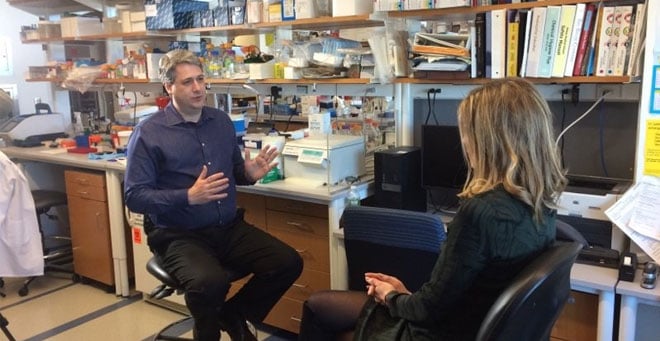 |
|
|
John Landers, PhD, told WCVB-TV’s Chronicle host Erika Tarantal how his discovery of an ALS gene is making a difference in the quest for a cure. |
UMass Medical School scientist John Landers, PhD, told WCVB-TV’s Chronicle host Erika Tarantal how his discovery of an ALS gene—research funded in part by the Ice Bucket Challenge—is making a difference in the quest for a cure.
Dr. Landers, professor of neurology, and Jan Veldink, PhD, at University Medical Center Utrecht in the Netherlands, identified variations in NEK1, a gene with multiple functions in neurons, present in approximately 3 percent of all cases of both sporadic and familial ALS in North America and Europe, making it one of the most common genetic causes of the disease. The findings were published in Nature Genetics last summer, on the two-year anniversary of the Ice Bucket Challenge. The work was supported by The ALS Association through Project MinE, an international collaboration for gene discovery in ALS.
“In ALS patients, motor neurons begin to die or deteriorate,” Landers said in the interview that aired April 6 on Chronicle. “One thought is that the dying of this actually happens at the connection where the nerve connects to the muscle. You’ve essentially now lost control of your voluntary muscle.”
When the gene is defective, he said, it may impact the stability of these nerves, leading to their death.
Learn more in this Chronicle report:
WCVB-TV Unlocking ALS
Related stories on UMassMedNow:
New gene variants present in 3 percent of all ALS patients
Ice Bucket Challenge paying for genome sequencing in ALS patients
Substantial progress being made in ALS research at UMMS
UMMS ‘at the forefront’ in ALS research, reports Telegram, NECN
New ALS-associated gene identified using innovative strategy